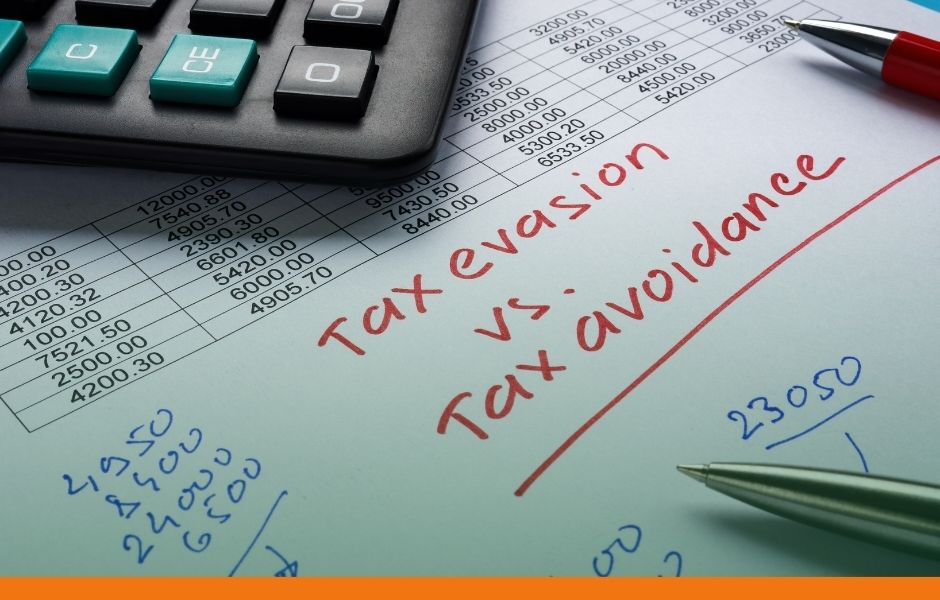
Taxation is an integral part of modern society, funding critical public services and government operations. Individuals and businesses often seek ways to minimize their tax liability within the boundaries of the law. However, there is a crucial distinction between two approaches: tax avoidance and tax evasion. Here, we’ll explore the fundamental difference between tax avoidance and tax evasion, helping you navigate the complex world of taxation with confidence.
Tax Avoidance Defined
Tax avoidance is a legitimate approach to minimize tax liability within the boundaries of tax laws. It involves strategic financial planning and the use of lawful methods to reduce one’s tax liability. Key characteristics of tax avoidance include:
1. Legal Methods:
Tax avoidance uses methods that are fully compliant with tax laws and regulations.
2. Minimizing Tax Liability:
The primary goal of tax avoidance is to reduce the amount of taxes an individual or business owes.
3. Transparency:
Tax avoidance strategies are typically transparent and openly disclosed to tax authorities.
4. Acceptable Tax Planning:
Tax avoidance often involves acceptable tax planning, such as claiming deductions, credits, and exemptions to legally reduce tax obligations.
Tax Evasion Defined
Tax evasion, on the other hand, is an illegal practice involving deliberate efforts to underreport income, overstate expenses, or engage in fraudulent activities to reduce tax liability. Key characteristics of tax evasion include:
1. Illegal Activities:
Tax evasion relies on illegal activities, such as falsifying records, concealing income, or hiding assets.
2. Underreporting Income:
Tax evaders intentionally underreport income to reduce their tax liability.
3. Concealment of Assets:
Assets are often concealed to avoid taxation, and offshore accounts may be used to hide income.
4. Non-Transparency:
Tax evasion is characterized by a lack of transparency, as individuals and businesses do not disclose these activities to tax authorities.
Examples of Tax Avoidance
Tax avoidance strategies include a wide range of legitimate practices, such as:
1. Claiming Deductions:
Individuals and businesses claim allowable deductions to reduce their taxable income. For example, deducting mortgage interest, medical expenses, or business expenses.
2. Utilizing Tax Credits:
Taxpayers use tax credits, such as the Child Tax Credit or the Earned Income Tax Credit, to lower their tax liability.
3. Investment Planning:
Investors may engage in tax-efficient investment strategies, like holding investments for the long term to qualify for lower capital gains rates.
4. Retirement Accounts:
Contributions to retirement accounts, such as 401(k)s or IRAs, are tax-advantaged methods to reduce current tax liability.
Examples of Tax Evasion
Tax evasion includes a wide array of illegal activities, such as:
1. Underreporting Income:
Individuals and businesses may fail to report income accurately or hide cash transactions.
2. Inflating Deductions:
Falsely inflating expenses or deductions to reduce taxable income is a common tax evasion tactic.
3. Offshore Accounts:
Tax evaders may use offshore accounts to conceal income and assets, avoiding detection by tax authorities.
4. Paying Employees Under the Table:
Businesses may pay employees in cash, avoiding payroll taxes and income tax withholding.
Legal Consequences of Tax Evasion
The legal consequences of tax evasion can be severe and include:
1. Criminal Charges:
Tax evasion is a criminal offense that can result in prosecution and potential imprisonment.
2. Hefty Fines:
Individuals and businesses found guilty of tax evasion face substantial fines.
3. Asset Seizure:
Tax authorities may seize assets and property to satisfy tax debts.
4. Felony Conviction:
A conviction for tax evasion is a felony and can have long-lasting personal and professional implications.
The Thin Line Between Avoidance and Evasion
The line between tax avoidance and tax evasion can be thin and may blur in some situations. It’s essential to understand where the boundary lies and consult with tax professionals to ensure compliance with tax laws.
- Consultation with Experts: Engaging with tax professionals, such as certified public accountants (CPAs) or tax attorneys, can help individuals and businesses navigate the complex tax landscape while ensuring full compliance with tax laws.
- Transparency: Transparency and accurate record-keeping are essential in distinguishing between tax avoidance and evasion. Maintaining comprehensive financial records and tax documentation can support your tax avoidance practices.
- Ethical Considerations: Practicing tax avoidance rather than tax evasion is not only legally sound but also aligns with ethical and moral principles.
Conclusion
Understanding the fundamental difference between tax avoidance and tax evasion is paramount in navigating the complexities of taxation. Tax avoidance involves legitimate methods to minimize tax liability within the boundaries of the law, while tax evasion relies on illegal activities to evade taxes. Compliance with tax laws, transparency, and ethical considerations are vital in making sound financial decisions and ensuring a secure financial future.







